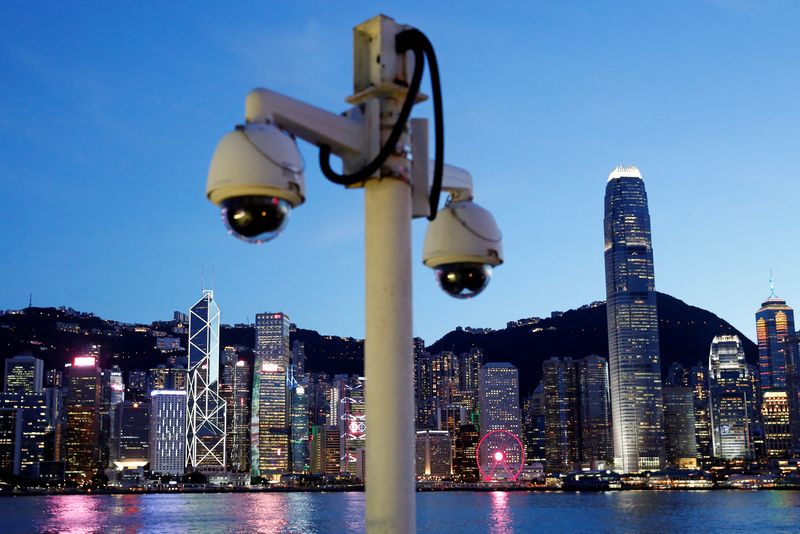By Aleksander Solum
HONG KONG (Reuters) - Adrian Lau is one of a very few independent candidates running in elections Sunday for Hong Kong's Legislative Council. The elections are the first since Beijing imposed a sweeping national security law and a shake-up of the city's electoral system.
The new system puts in place what the government calls an improved electoral system under the principle of "patriots ruling Hong Kong". All candidates must be approved by a national security vetting committee.
The major pan-democratic parties in Hong Kong, traditionally seen as the opposition, have not fielded or endorsed any candidates. Many opposition legislators resigned from the legislature in November 2020 in protest against the government disqualifying elected legislators.
Lau, running for the legislature for the first time, describes himself as an independent democrat.
He says there are some benefits in running and hopes to prevent the legislature from fast-tracking the government's initiatives without proper scrutiny.
"The best thing for us is that there will still be one person (in the legislature) who belongs to the democratic side. Someone who can keep speaking out for the Hong Kong people," Lau told Reuters. "I will make use of the tools and resources in the Legislative Council, and make sure to keep speaking the truth, to keep speaking common sense."
The Hong Kong government has repeatedly said that rights and protections, including freedom of speech, are protected by a national security law that went into effect last year.
In Sunday's election, only 20 out of 90 seats will be directly elected by the public, from a choice of 35 candidates. There are 153 candidates in the elections, all of whom were vetted before being allowed to run. Of these, only around a dozen moderates with different backgrounds say they are not aligned with the pro-establishment camp, with the rest comprising pro-Beijing and pro-establishment figures.
A Hong Kong government spokesperson did not respond to Reuters questions on why the number of independent candidates running in the election is small.
In February, police charged 47 Hong Kong democracy campaigners and former legislators with conspiracy to commit subversion for their role in an unofficial "primary election" after Beijing imposed the national security law on the city last year.
Soon after the arrests, China's parliament announced sweeping changes to the electoral landscape, reducing the number of directly elected seats from half to around a quarter, while an electoral committee stacked with pro-Beijing figures will select 40 of the legislative seats.
A new vetting body was also set up at China's behest and headed by senior Hong Kong officials to screen potential candidates to ensure only "patriots" run, according to government statements.
Lau, who is running in the legislative election for the first time, told Reuters he spent two weeks seeking nominations from pro-Beijing figures and got 10, the minimum required, through a business contact he declined to name.
Jean-Pierre Cabestan, a Hong Kong based political scientist, said the new electoral reforms had put the traditional pro-democracy opposition in a bind.
"The pan-democrats are facing a real dilemma because on the one hand, if you accept the new rules of the game, you can be accused of legitimising a system which is basically unfair. And if you boycott the system, you don't have a chance of having a voice in the new political arrangement," he said.
Hong Kong leader Carrie Lam has said the elections were now "much more representative with more balanced participation" and would elect those "who are patriotic to govern the city".
Ng Chau-pei, a member of the National People's Congress and the head of the pro-Beijing Hong Kong Federation of Trade Unions, is a staunch supporter of the electoral shake-up. The pro-establishment candidate told Reuters he was running to help resolve deep-rooted social problems related to areas including housing, an ageing society, and a gaping wealth gap in the city.
While Hong Kong's new electoral system has been criticised by foreign governments and overseas activists, some of whom have called for boycotts, Ng described it as a key and necessary step to improve governance in the city.
"In the past, the Legislative Council had been paralysed due to the interference of foreign powers and collusion between internal and external forces," Ng said. "The government's work has also been obstructed, resulting in many missed opportunities with regards to taking care of our livelihood and economic issues.

Ng described accusations of dwindling freedoms in the Asian financial capital as simply "electioneering".
"Our current Legislative Council has 90 representatives, unlike in the past, where there were 70. What that means is that there is even wider representation. The participation is more even and spread out and all sorts of stakeholders will now be able make their voices heard."